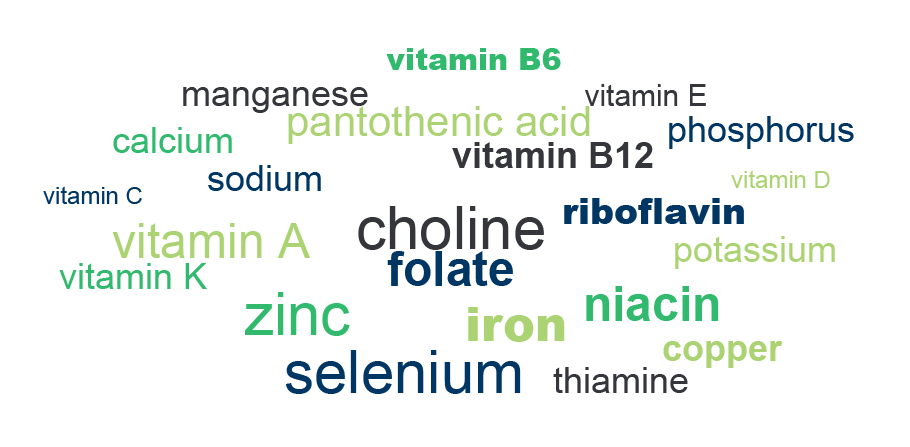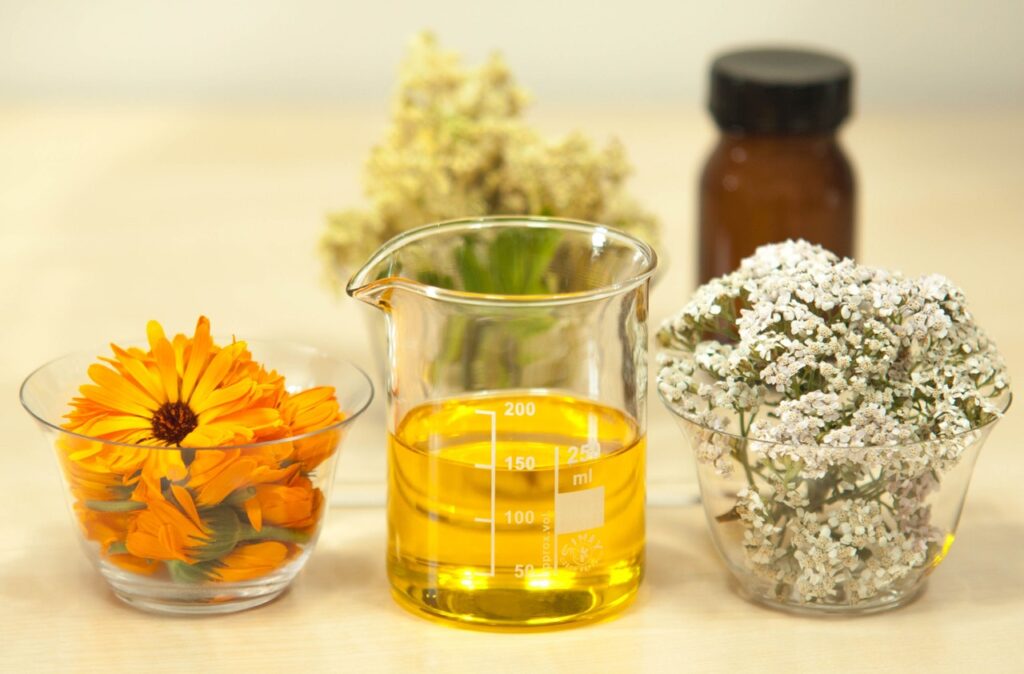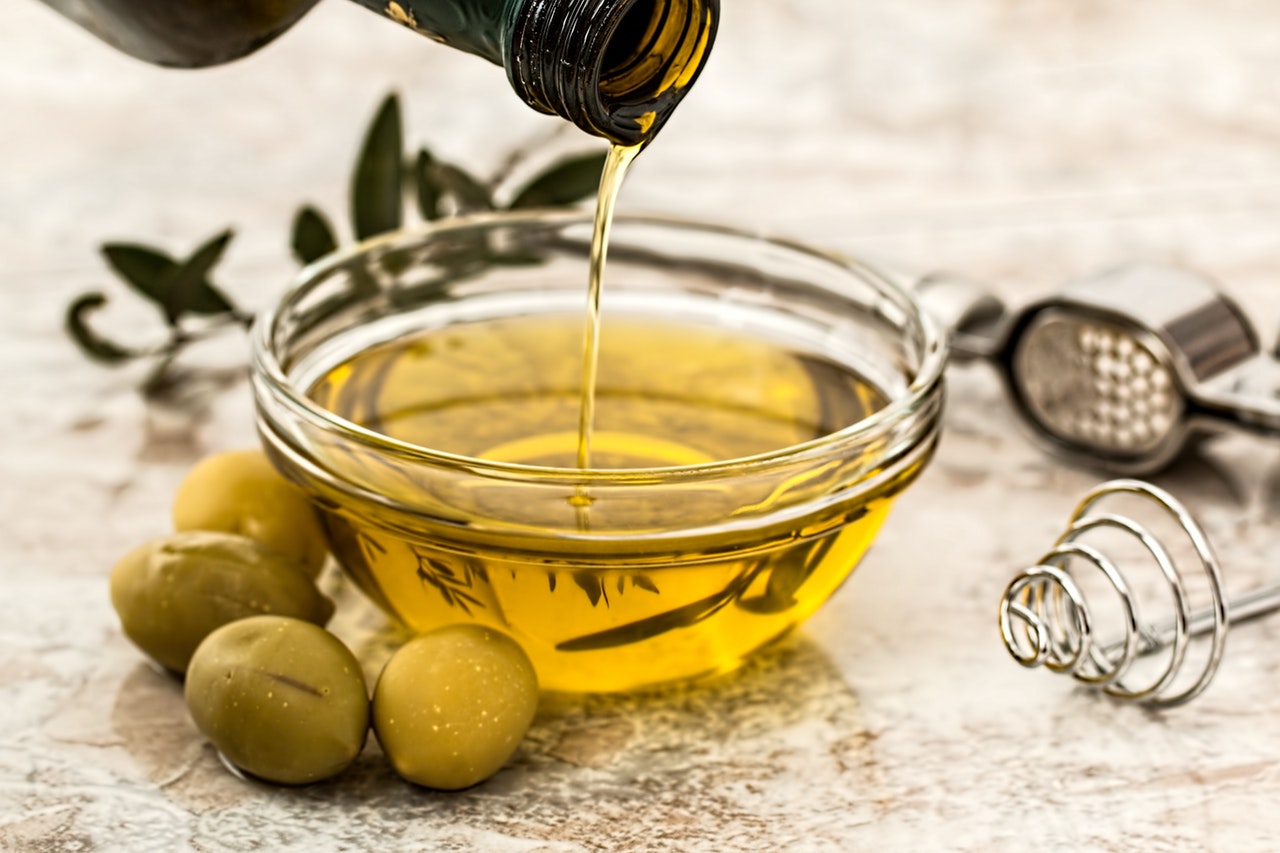Sunflower Oil for Skin Care Explained
Many are curious why it seems sunflower oil has become a more popular ingredient and more common in skin care products.
What exactly are their scientific skin care benefits?
Benefits
Sunflower oil in skin care provides many benefits far beyond the nutrients it contains.  However, not all sunflower oil is created equal.
However, not all sunflower oil is created equal.
For reference, we’re talking about high-oleic, cold-pressed, organic sunflower oil, the only kind used in our skin care products.
Organic sunflower oil has been shown to contain higher concentrations of antioxidants, so that’s what we use (USDA certified).
Sunflower Oil Types
High-oleic: This means (sunflower) oil that’s high in oleic acid – a monounsaturated fat(ty acid). High-oleic oils have better shelf stability than ‘linoleix’ oils. They also do a better job of retaining their nutrient profiles during processing like when we emulsify it with purified water.
Cold-pressed: It’s simply an extraction method; one that uses no additional heat or chemicals to extract oil from ingredients. This results in purer, more nutrient-dense oil.
Organic: Technically, this is a certification issued by regulatory agencies, “organic” generally means that no only natural ingredients are used in a product’s manufacturer.
Nutrient Absorption
Sunflowers produce a huge range of nutrients, minerals, and vitamins making them a great natural oil for skin care.
Here are some of them: 
These are ingredients your skin (and the rest of your body) craves. For skin care, they should be applied topically (rather than orally) to ensure effective delivery.
Applying essential oils or acids directly to your skin isn’t a good idea because they can be strong irritants in their pure form. Your skin only needs trace amounts of these nutrients and much of them would go to waste.
Sunflower oil is an ideal “carrier” oil for many of these nutrients because it’s easy for your skin to absorb. Once absorbed, the nutrients penetrate deep into the hypodermis to nourish your subcutaneous fat cells (which fuel regeneration and renewal).
Should I start applying sunflower oil directly on my face?
Not exactly. On its own, sunflower oil doesn’t penetrate deep enough to be effective and, of course, feels oily (but it would help give your skin a soft, lustrous surface-shine as it absorbed). Instead, look for skin care products formulated with SF oil because your skin needs the right blend of oil and water to absorb the most nutrients.
Think about the last time you took a swim. Your skin”‘pruned” because it absorbed water. The right blend of nutrient-dense sunflower oil and water – not too oily, not too wet – is the perfect skin care delivery vehicle.
How does this stuff affect your skin?
Let’s look at sunflower oil’s nutrients, vitamins, and essential fatty acids individually.
Free Radical and Antioxidants
Free radicals are atoms or molecules with one missing electron. They can be caused by exposure to pollutants/contaminants or created naturally by our bodies over time. Over time, they can cause a wide range of damage (including heart disease and cancer) by “stealing” electrons from important cellular structures.
Antioxidants are substances which can freely, safely ‘donate’ an electron. They make atoms/molecules stable again by neutralizing the free radical.
Vitamin C
It’s vital in maintaining healthy skin. It’s an important part of collagen production and has antioxidant properties that can limit/reduce damage caused by excess sun exposure. Collagen is part of your skin’s support structure and, when it’s healthy, prevents and reduces wrinkles.
Vitamin E
Sunflower oil is one of the best natural oils for skin care because it’s especially rich in Vitamin E, and Vitamin E’s a top antioxidant. It’s also been shown to help reduce inflammation and moisturize dry or sunburned skin, lessening premature signs of aging.
Vitamin K
This vitamin plays a critical role in a variety of systems, from blood to bones. In skin care, vitamin K plays a major role in wrinkle reduction by preventing the hardening of elastin, the stretchy protein that gives healthy skin its soft, springy texture.

Vitamin D2 and D3:
Along with sunflower oil’s abundance of antioxidants which are proven to aid in antiaging, nourishing and hydrating they skin, it also contains Vitamin E and K. As it is a botanical plant oil it has an abundance of metabolites and precursors of Vitamin D2 and D3 which are converted to be used by the skin. It is a natural carrier oil containing lipids easily absorbed by the skin. It is proven non-comedogenic, and is even used to protect the skin of premature infants from infections. Topical application of products (such as the Metrin Skincare System) containing sunflower oil will supply and deliver Vitamin D2 and D3 to the skin for its use. Click here to read about the benefits of Vitamin D for the skin.
Omega-3, 6 & 9 (Essential Fatty Acids/ Ceramides)
In addition to Omega-3 and Omega-6, high-oleic sunflower oil contains Omega-9. All three of these monounsaturated fatty acids (MUFAs) help prevent and reduce skin inflammation, protect against infection, and reduce signs of aging caused by sun exposure.
Amino Acids (AKA Peptides)
These are the building blocks of the proteins you need to survive. High-oleic sunflower oil contains a lot of them, and cold-pressing helps preserve them (they’re easily rendered unusable by heat).
Think of amino acids as fuel for your skin’s natural renewal process: as cells divide to produce collagen, elastin, new skin cells, and other components of healthy skin, they need enough amino acids “in the tank” to continue functioning properly.
Properties
Your skin’s the barrier between the outside world and the rest of you. It constantly renews itself and produces sebum (oil) to ward off contaminants, pollutants, and microbes. Alas, sometimes it goes under or overboard and you end up with clogged pores that can harbour bacteria and lead to breakouts and infections.
Sunflower oil for skin care is a non-irritant “non-comedogenic” oil, meaning it’s easily absorbed and won’t clog your pores.
Quite the opposite – it can even help clear them by loosening accumulated collections of bacteria, dirt, makeup, and dead skin cells. Its linoleic acid helps reduce inflammation caused by the aforementioned.
Oleic acid (“high-oleic”, remember?) has a high lipid count, making it a great natural moisturizer and one that can penetrate deep into your skin. You’ll often see it listed in soaps, lotions, and other skin care cleansing and moisturizing products for this reason.
Well-hydrated skin is soft and smooth provided there’s balance – you can think of swim-time pruny-fingers as ‘over-moisturized skin’).
Protection
Thanks to its polyunsaturated fatty acid content, sunflower oil has even been shown to help reduce the risk of infection by improving the skin’s barrier function and structural integrity.
The skin care science of sunflowers is ultimately that of a beautiful plant with a fascinating history of global production.
Remember, we’re talking high-oleic, cold-pressed, certified-organic sunflower oil for skin care, because it delivers the best nutrition for superior results. Other varieties do exist but their mileage may vary.
Metrin Skincare is proud to contain high-oleic, cold-pressed, certified-organic sunflower oil in our products! Shop our skincare systems sets today:https://www.metrin.com/shop/
Don’t forget 6 month’s guarantee – It’s our promise to you! For more details click here: https://www.metrin.com/metrin-6-month-guarantee/
References:
Anti Ageing Benefits of Vitamin D from <https://www.metrin.com/anti-ageing-skin-benefits-of-vitamin-d/>







